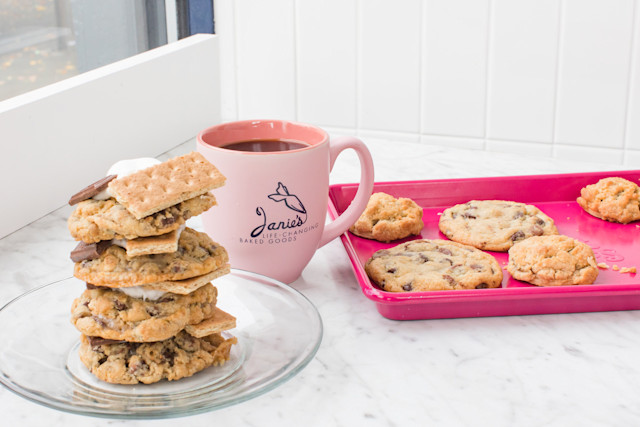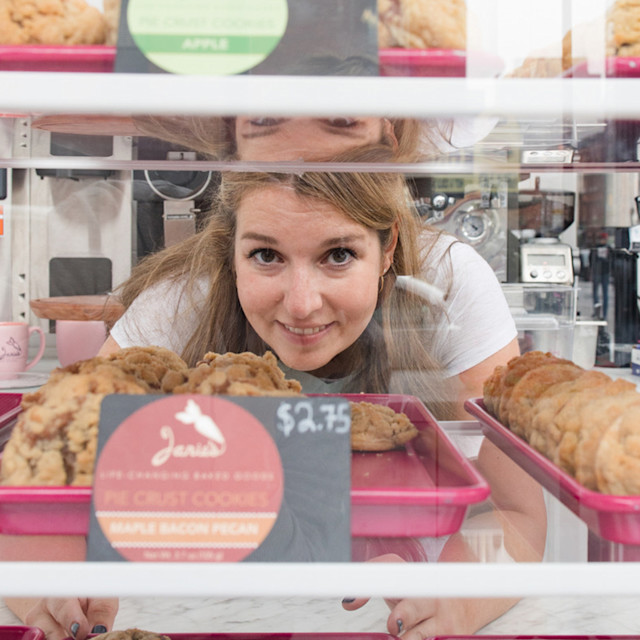How bake shop owner Janie Deegan went from being unhoused in New York City to becoming a Food Network star.
For Janie Deegan, launching Janie’s Life-Changing Baked Goods — her eponymous bake shop with three New York City locations — in 2015 was the result of an arduous journey that consisted of ups, downs, and everything in between. Now in her 30s, the entrepreneur has gone from struggling with addiction and being unhoused, to getting sober at 25 and owning a successful business — not to mention winning Food Network’s "Chopped Sweets" competition. Simply put, “Janie’s” has been truly life-changing for Deegan, whose famous pie crust cookie was once dubbed “The Next Cronut” by top food industry experts.
These days, Deegan has found community in sobriety and within each of the neighborhoods where “Janie’s” is located. When she isn’t baking, running a business, or impressing celebrities with her famous pie crust cookies, Deegan runs marathons and takes Precision Run classes at Equinox to train for them.
Equinox+ chatted with Deegan about finding self-worth and connecting with others, her most important achievement to date, and the big moment that prompted a six-month waitlist for her baked goods.

What was your life like leading up to sobriety?
“I had absolutely nothing going on except living in the complete darkness and desperation that comes with active addiction. I was a ball of anxiety, had no hope or dreams for the future, and just was constantly in the cycle of addiction: seeking drugs and alcohol to feel better and then spinning out in shame. I had completely isolated myself from friends and family — those who were even willing to be around me — and didn’t have a job or a home.”
How did you get into baking?
“I got sober at 25 and was living in the East Village, working as a super and taking care of four buildings. I couldn’t look people in the eyes, and thought I was disgusting and worthless, but I desperately wanted to stay sober. I am an artist at heart and needed a creative outlet. I grew up in a household — and have extended family — that loved to cook. I had a sweet tooth that had never existed — thanks, alcohol! — and baking was this fairly inexpensive, low-stakes, meditative act of self-care.
“My life was so out of control, and baking is so scientific and controlled; I had to follow the steps in order to get the desired outcome, and master those steps before breaking the rules. It was a quite literal metaphor for my life. At a time when I could barely look people in the eyes, I was devastatingly lonely and yearned for connection. I started bringing sweets everywhere I went, feeding people. Seeing their whole physicality change when they ate a yummy treat was a simple bridge back to connection and self-worth.”
RELATED: Why You Need an Empathy Practice
How did the bake shop get started?
“People started asking me if I was going to open a bakery, which I found absolutely absurd. I had no MBA, culinary degree, or money — all of which were obviously necessary to start a food business. It wasn’t even a dream in my head. But the seed was planted, and I started thinking, ‘Wouldn’t that be cool?’ It was a real crossroads in my life, a time when I was completely paralyzed by the idea of ‘What’s next?’
“A friend of mine asked to buy a cake for a big event. Someone having the faith in me — that I did not have in myself — utterly blew me away. Thanksgiving was a few weeks later, and I thought, ‘Why not try to sell a few pies for Thanksgiving?’ I sold dozens. What completely floored me was that my community was spreading the word with such confidence, generosity, and love — that people I had never met were putting their faith in me for their Thanksgiving dinners.
“The first two years I baked from home, nannied full-time, and put the work into figuring out how to build a food business in New York City. Luckily, there are so many free and low-cost resources for small businesses here if you are willing to look for it. Two years in, I was able to move to a shared commercial kitchen. Three years later, I signed my first brick-and-mortar lease — in the middle of the pandemic.”

You told 'The New York Times' that being sober is your biggest achievement. Do you still feel that way?
“Yes! Being sober has saved my life and opened me up to a magical beautiful world of hope, love, and huge dreams. I am one of those people who would die if I started using again, so my sobriety is always — and I hope always will be — the foundation my life is built upon.”
What was your big break, career-wise?
“Wow, there are way too many to count. Obviously, that first cake I sold will forever be my biggest and most important sale. And over the years, so many complete strangers with influence have tried my product and decided to give me a boost.
“At the beginning of 2021, when I was bursting at the seams of my shared commercial kitchen but didn’t have the capital to go out on my own, Andrew Zimmern tried our pecan pie crust cookies and posted on Instagram. We got an insane amount of orders, which literally gave me the money I needed to sign a lease, take the leap of faith, and go out on my own. A month after we opened our first bakery, Andy Cohen tried our cookies and invited me to be a bartender on [Bravo TV’s] 'Watch What Happens Live.' The sales from that appearance had us back-ordered for six months, helped pay for the first location, and helped us open a second location which now serves as our headquarters and production space.
“And of course, being in 'The New York Times' was such a bucket list moment. There are dozens of more moments and examples like this. I’m always blown away by strangers’ generosity and willingness to help our little bakery grow. It’s been a total grassroots effort.”
Being sober has saved my life and opened me up to a magical beautiful world of hope, love, and huge dreams
What have you learned by breaking ground in different areas of Manhattan?
“The shared commercial kitchen I was in from 2018 to 2021 was in East Harlem, which has the most incredible and magical community of small business owners. They have become some of my best friends and mentors. When we ran out of pie boxes the day before Thanksgiving, I had three different businesses offer me their extra ones. I credit where I am today to having that community when I first opened. When we needed to expand to a second larger location in 2022, East Harlem was the obvious choice.
“The Upper West Side was my first real location, and it’s also where I grew up, so it felt like the ultimate feat and ‘coming home story’ to open there. The residents of the neighborhood have truly been the best allies and advocates. We are down the stairs on a little tiny side street, but the community has tirelessly continued to spread the word about us. In 2018 to 2019, Equinox was actually a huge part of the community for me. I was able to barter with the Upper West Side location. I would bake a healthy breakfast item for the Club once a month in exchange for a free membership. It was a total game changer for me at the time.
“The West Village has been amazing as well. So many of the residents have been there for decades and decades, and are so happy to see the storefront filled with small businesses like mine, instead of huge corporate businesses.”
RELATED: Livewear Makes an Impact
You hire people who are trying to do better for themselves after hard times. Why is this important to you?
“When I got sober at 25, until the time I started the business a few years later, the idea of entering the job market with virtually no resume and very little experience except for service jobs, felt so hopeless and overwhelming. Although I wish I could put my sobriety and the journey it took to get sober on a resume, unfortunately it would look absurd and unprofessional to a potential employer. How do I explain years of gaps on my resume?
“When I started dreaming up the type of business and employer I wanted to be, it was super important to me that people’s past experiences not get in the way of their future hopes and dreams. That doesn’t mean we will hire anyone, but what it does mean is we look for potential and work ethic that a prospective employee has today. When I got sober, I was one of the hardest workers. I was so eager to prove myself and really applied myself to every odd job I had, whether it was sorting recycling as a super or picking kids up after school and making it the best three hours of their day.
“I have found that trait is so common in people who have just overcome something really difficult. I have met many of the most dedicated team members through hiring this way. We can teach anyone what they need to know as long as they are willing to learn. It’s also been amazing to attempt to cultivate the type of work environment I had never experienced before. I don’t do it perfectly by any means, but it’s a beautiful and rewarding attempt to cultivate a judgment-free, non-toxic, and oftentimes fun environment to work in.”
On top of all that you do, you run marathons.
“I’m obsessed with Equinox’s Precision Run. It has really completely changed my marathon training game and helped me improve speed and endurance. I’m one of those people who will never do sprints or hills on my own, so it’s so amazing to have these classes to kick my butt.”
Images Courtesy of Janie Deegan
